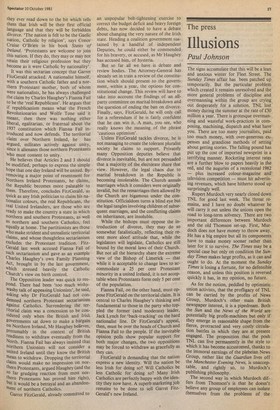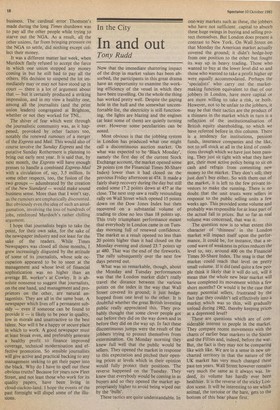The press
Illusions
Paul Johnson
The signs accumulate that this will be a lean and anxious winter for Fleet Street. The Sunday Times affair has been patched up temporarily. But the particular problem which created it remains unresolved and the more general problems of discipline and overmanning within the group are crying out desperately for a solution. TNL lost money during the summer at the rate of £30 million a year. There is grotesque overmanning and wasteful work-practices in composing, machining, dispatch and what have you. There are too many journalists, paid too much money, with over-generous expenses and grandiose methods of setting about getting stories. The falling pound has put up the cost of imported newsprint in a terrifying manner. Rocketing interest rates are a further blow to papers heavily in the red, and the auguries of a recessional 1982 — plus increased colour-magazine and television competition — must hit advertising revenues, which have hitherto stood up surprisingly well.
Rupert Murdoch very nearly closed down TNL for good last week. The threat remains, and I have no doubt whatever he will carry it out unless the unions open the road to long-term solvency. There are two important differences between Murdoch and the old Thomson set-up. First, Murdoch does not have money to throw away. He has a big empire but all its components have to make money sooner rather than later for it to survive. The Times may be a special case but only on condition the Sunday Times makes large profits, as it can and ought to do. At the moment the Sunday Times is losing a fortune, for no defensible reason, and unless this position is reversed quickly it has, in my opinion, no future.
As for the notion, peddled by optimistic union activists, that the profligacy of TNL can be carried by the profits of News Group, Murdoch's other main British newspaper interest, it is a pipedream. Both the Sun and the News of the World are potentially big profit-machines but only if they emerge in reasonable shape from the fierce, protracted and very costly circulation battles in which they are at present engaged. The proposition that the posh TNL can live permanently in the style to which it has become accustomed, thanks to the immoral earnings of the plebeian News Group, rather like the Guardian lives off the Manchester Evening News, is unacceptable, and rightly so, to Murdoch's publishing philosophy.
The second way in which Murdoch differs from Thomson's is that he doesn't believe any group of employees can isolate themselves from the problems of the business. The cardinal error Thomson's made during the long Times shutdown was to pay all the other people while trying t o starve out the NGA. As a result, all the other unions, far from bringing pressure on the NGA to settle, did nothing except collect their money.
It was a different matter last week, when Murdoch flatly refused to accept the farce in which one union stopped any money coming in but he still had to pay all the others. His decision to suspend the lot im mediately may or may not have stood up in court — there is a lot of argument about that — but it certainly produced a striking impression, and in my view a healthy one, among all the journalists (and the print union leaders) congregated at Brighton, whether or not they worked for TNL.
The shiver of fear which went through the journalistic community was, as it happened, provoked by other factors too, notably the renewed rumours of a merger of the Express and Mail. This would also of course involve the Sunday Express and the putative Sunday Rothermere is planning to bring out early next year. It is said that, by next month, the Express will have enough presses to handle a combined Express-Mail with a circulation of, say, 3.5 million. In some other respects, too, the fusion of the two groups — adumbrated by the creation of the New Standard — would make sound business sense. More than that I won't say, as the rumours are emphatically discounted. But obviously even the idea of such an amalgamation, involving the loss of hundreds of jobs, reinforced Murdoch's rather chilling argument.
I hope that journalists begin to take the point, for their own sake, for the sake of the newspaper industry and not least for the sake of the readers. While Times Newspapers was closed all those months, I grew increasingly disgusted by the attitude of some of its journalists, whose sole occupation appeared to be to sneer at the management and whose level of financial sophistication was no higher than an average BL worker's at Cowley. It is absolute nonsense to suggest that journalists, on the one hand, and management and proprietors on the other, are natural antagonists. They are all in the same boat. A newspaper which lives off a permanent subsidy — even if someone can be found to provide it — is likely to be poor in quality, low in morale and unattractive to the best talent. Nor will it be a happy or secure place in which to work. A good newspaper must at least break even, and preferably generate a healthy profit to finance improved coverage, technical modernisation and effective promotion. So sensible journalists will give active and practical backing to any management seeking to get their paper into the black. Why do I have to spell out these obvious truths? Because for years now Fleet Street, and not least those who work for its quality papers, have been living in cloud-cuckoo-land. I hope the events of the past fortnight will dispel some of the illusions.







































 Previous page
Previous page